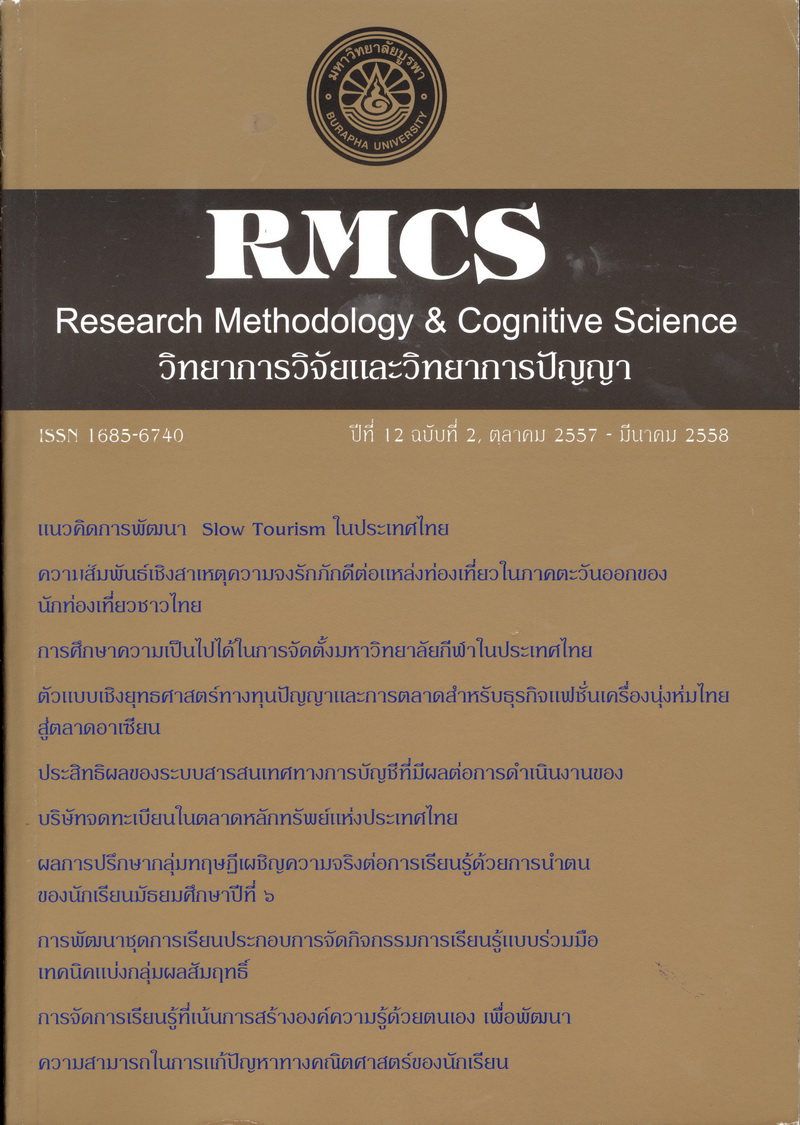ิทธิพลของความฉลาดทางวัฒนธรรมที่มีต่อการปรับตัวข้ามวัฒนธรรมและ ผลการปฏิบัติงานของพนักงานข้ามชาติในประเทศไทย
Main Article Content
Abstract
วัตถุประสงค์ของการศึกษานี้ เป็นการตรวจสอบความสัมพันธ์ระหว่างความฉลาดทางวัฒนธรรม (Cultural Intelligence: CQ) และการปรับตัวข้ามวัฒนธรรม (Cross-cultural Adjustment: CCA) ในเชิงประจักษ์ ซึ่งมีอิทธิพลต่อผลการปฏิบัติงาน (Job Performance: EJP) ของพนักงานข้ามชาติที่เข้ามาทํางานในประเทศไทย โดยการศึกษาได้ระบุถึงปัจจัยที่เป็นผลในเชิงลบของความขัดแย้งระหว่างวัฒนธรรมของพนักงานข้ามชาติและวัฒนธรรมไทย การวิจัยนี้ใช้แบบสอบถามเป็นเครื่องมือในการเก็บข้อมูลจากกลุ่มตัวอย่างซึ่งเป็นพนักงานข้ามชาติที่ทํางานในประเทศไทยจํานวน 377 คน และใช้โมเดลสมการโครงสร้างในการวิเคราะห์ข้อมูล ผลการวิจัยชี้ให้เห็นว่าความฉลาดทางวัฒนธรรมมีอิทธิพลทางอ้อมต่อผลการปฏิบัติงานของพนักงานข้ามชาติโดยผ่านตัวแปรการปรับตัวข้ามวัฒนธรรม ในขณะที่งานวิจัยบางฉบับระบุว่าความฉลาดทางวัฒนธรรมกับผลการปฏิบัติงานของพนักงานข้ามชาติในประเทศไทยไม่มีความสัมพันธ์กัน ดังนั้นบริษัทระหว่างประเทศและพนักงานข้ามชาติจึงควรตระหนักถึงอุปสรรคทางด้านวัฒนธรรมที่จําเป็นต้องประสบเมื่อไปทํางานยังประเทศอื่น บริษัทระหว่างประเทศจึงควรจัดการกับเรื่องเกณฑ์การคัดสรร การเตรียมความพร้อม และการส่งเสริมกลไกลต่าง ๆ เพื่อลดปัญหาทางด้านความแตกต่างทางวัฒนธรรมให้แก่พนักงาน
Cultural Intelligence as an Influential Factor on Cross-Cultural
Adjustment and Job Performance among Expatriates in
Thailand
Polthep Poonpol
Assumption University, Thailand
The objective of this study was to empirically examine the relationship between expatriates’ cultural intelligence (CQ), and their degree of cross-cultural adjustment (CCA) as indicated by their job performance (EJP) in Thailand, the host country. This study addressed factors minimizing the negative consequences of discrepancies between expatriate’s home country culture and Thai culture. This study primarily used a questionnaire to collect data from expatriates working in Thailand. The sample comprised 377 expatriates who transferred from other countries to Thailand for working purposes. Structural Equation
Modeling was employed for statistical analysis. Results indicated that cultural intelligence indirectly influenced expatriates’ job performance through cross-cultural adjustment. In contrast to the findings of some earlier research, this study found no relationship between cultural intelligence and performance of expatriates in Thailand. Therefore, multinational companies and expatriates have to be aware of the invisible barriers and
cultural obstacles they have to face when moving to work in another country. Therefore, selection criteria, preparations and supporting mechanisms should be well managed by multinational corporations.

